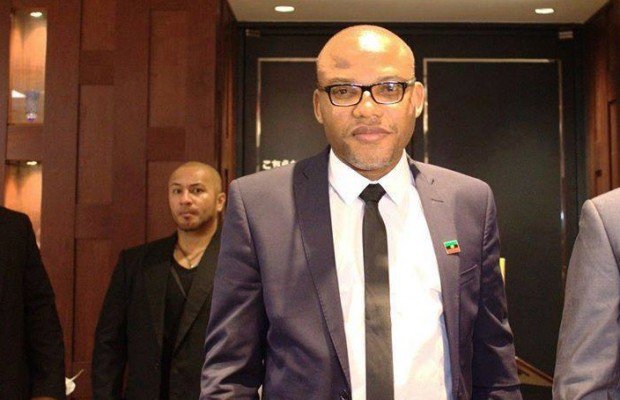Professor Ben Nwabueze, an elder statesman had revealed the blueprint on how to get Nnamdi Kanu, leader of the Independent People of Biafra (IPOB) to drop the agitation for the Biafran state.
The eminent lawyer made the remark yesterday at a press conference he addressed on behalf of the Southern Leaders of Thought at Chief Rotimi Williams’ Chambers in Lagos.
He said the IPOB leader, Nnamdi Kanu, has assured him that his group would stop Biafra agitation if the nation is restructured, Sun reports.
He said: “Self determination doesn’t mean secession as IPOB is clamouring. It means the ethnic nationalities want to govern themselves within Nigeria.
“Restructuring is not a matter that can be implemented by amendment of the 1999 Constitution. It imperatively requires a new constitution adopted or approved by the people at a referendum.
“It is sad that while the clamour for restructuring is reaching a crescendo and is sweeping across the country, the National Assembly is still regaling us with talks about constitution amendment, and buttressing its position by the erroneous assertion that the 1999 constitution can only be amended or altered (sections 8 and 9 ), but cannot be abolished and replaced by a new constitution. By taking this untenable position, the National Assembly makes itself a big obstacle in the way of restructuring.”
Nwabueze said negotiated restructuring, implemented through a new constitution, is the best assurance for the realisation of the group’s desire for one Nigeria.
“We think the way forward for Nigeria is for the people, in exercise of the power inherent in them as a sovereign people, to make through a referendum, new constitution, constituting a new political order,” he said.
Nwabueze noted that members of the group were committed patriots, imbued with an abiding faith in one Nigeria, and the belief that the majority of Nigerians share the same faith, but wish to be given opportunity to negotiate changes in governmental structures, needed to accomplish their desires, believing that appropriate structures must be put in place for good governance.
“In our circumstances as a country, with a great vast expanse of territory, comprising a great diversity of ethnic nationalities, with divergent interests and outlooks, it seems generally agreed that a federal system, truly so-called, is the system appropriate for our situation. We, therefore, conceive restructuring as requiring, modified as necessary, the restoration or re-establishment of the kind of federalism that existed under our 1960/1963 constitutions. That is the central object or purpose of restructuring,” he said.

